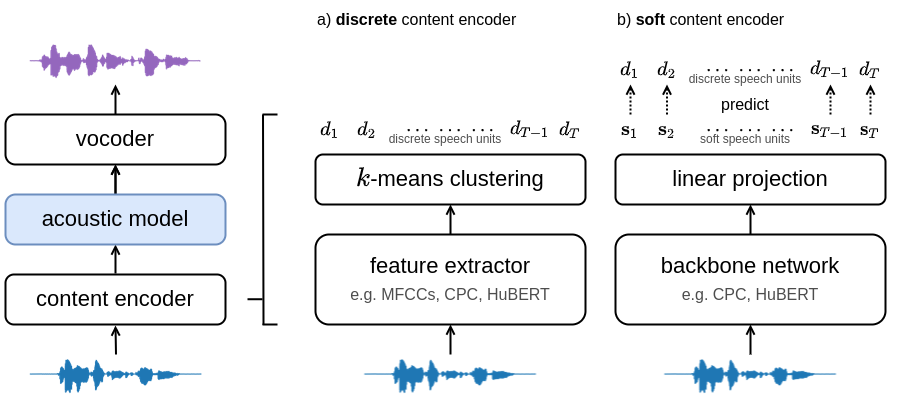Training and inference scripts for the acoustic models in A Comparison of Discrete and Soft Speech Units for Improved Voice Conversion. For more details see soft-vc. Audio samples can be found here. Colab demo can be found here.
import torch
import numpy as np
# Load checkpoint (either hubert_soft or hubert_discrete)
acoustic = torch.hub.load("bshall/acoustic-model:main", "hubert_soft").cuda()
# Load speech units
units = torch.from_numpy(np.load("path/to/units"))
# Generate mel-spectrogram
mel = acoustic.generate(units)usage: generate.py [-h] {soft,discrete} in-dir out-dir
Generate spectrograms from input speech units (discrete or soft).
positional arguments:
{soft,discrete} available models (HuBERT-Soft or HuBERT-Discrete)
in-dir path to the dataset directory.
out-dir path to the output directory.
optional arguments:
-h, --help show this help message and exit
Download and extract the LJSpeech dataset. The training script expects the following tree structure for the dataset directory:
└───wavs
├───dev
│ ├───LJ001-0001.wav
│ ├───...
│ └───LJ050-0278.wav
└───train
├───LJ002-0332.wav
├───...
└───LJ047-0007.wav
The train and dev directories should contain the training and validation splits respectively. The splits used for the paper can be found here.
Extract mel-spectrograms using the mel.py script:
usage: mels.py [-h] in-dir out-dir
Extract mel-spectrograms for an audio dataset.
positional arguments:
in-dir path to the dataset directory.
out-dir path to the output directory.
optional arguments:
-h, --help show this help message and exit
for example:
python mel.py path/to/LJSpeech-1.1/wavs path/to/LJSpeech-1.1/mels
At this point the directory tree should look like:
├───mels
│ ├───...
└───wavs
├───...
Use the HuBERT-Soft or HuBERT-Discrete content encoders to extract speech units. First clone the content encoder repo and then run encode.py (see the repo for details):
usage: encode.py [-h] [--extension EXTENSION] {soft,discrete} in-dir out-dir
Encode an audio dataset.
positional arguments:
{soft,discrete} available models (HuBERT-Soft or HuBERT-Discrete)
in-dir path to the dataset directory.
out-dir path to the output directory.
optional arguments:
-h, --help show this help message and exit
--extension EXTENSION
extension of the audio files (defaults to .flac).
for example:
python encode.py soft path/to/LJSpeech-1.1/wavs path/to/LJSpeech-1.1/soft --extension .wav
At this point the directory tree should look like:
├───mels
│ ├───...
├───soft/discrete
│ ├───...
└───wavs
├───...
usage: train.py [-h] [--resume RESUME] [--discrete] dataset-dir checkpoint-dir
Train the acoustic model.
positional arguments:
dataset-dir path to the data directory.
checkpoint-dir path to the checkpoint directory.
optional arguments:
-h, --help show this help message and exit
--resume RESUME path to the checkpoint to resume from.
--discrete Use discrete units.
If you found this work helpful please consider citing our paper:
@inproceedings{
soft-vc-2022,
author={van Niekerk, Benjamin and Carbonneau, Marc-André and Zaïdi, Julian and Baas, Matthew and Seuté, Hugo and Kamper, Herman},
booktitle={ICASSP},
title={A Comparison of Discrete and Soft Speech Units for Improved Voice Conversion},
year={2022}
}


